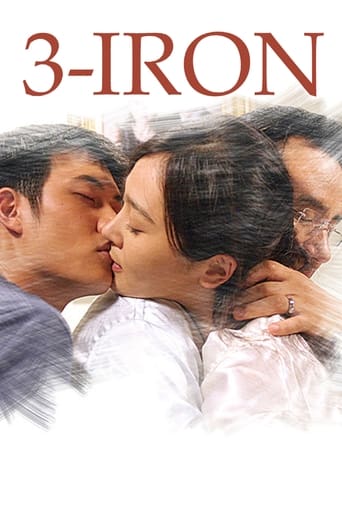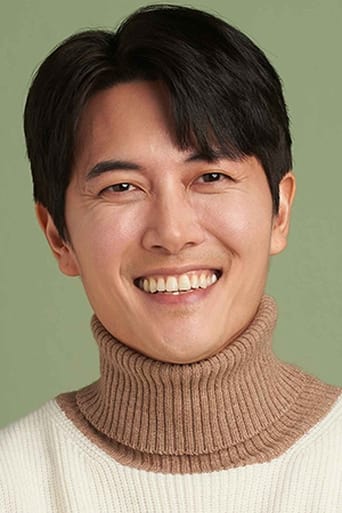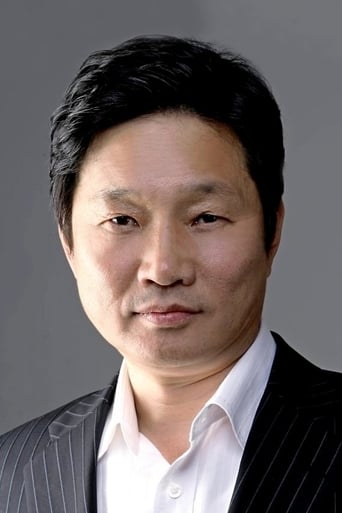teodorodontosaurus
Indeed it's unique, special, subtle and original.
A feature that makes this movie so good is the use of the uncanny principles: we don't know whether fantasy elements are being present here or not.
The reduced dialogue scenes is another feature that makes this movie unique; dialogue is replaced with symbolism; actually, symbolism may be the main feature of this movie.
Fact: only after the movie ends you realize how good it is.
A well-balanced movie full of... uncanny moments, symbolic imagery and events, allegories... all these hidden within an apparently banal movie.
This is a modern hidden/unknown/underrated movie masterpiece.
hoxjennifer
Tae-suk is not your typical breaking and entering burglar. He is a silent and in his own way, eloquent, gentleman who drifts between vacant houses, cleaning up after himself, doing repairs and house maintenance for his unassuming hosts. After stumbling upon an abused housewife, whose once captivating beauty has been reduced to scars and bruises, he rescues her from her isolation and shows her his world.What is notable about this film is that the two ethereal protagonists do not speak a word to each other throughout the entire film, except for two phrases by the female near the end. Yet, their silence is compelling and through facial expressions and actions, they tell a very passionate story of love that is open to interpretation and will keep you wanting to watch more. I am thoroughly impressed by this film. Loved the original concept.
Claudio Carvalho
The lonely and silent rider Tae-suk (Hee Jae) breaks in empty houses and lives a normal life while the owners are traveling. He does not steal anything and moves from house to house without any loss other than food, and he cleans the houses, provides small repairs or washes some clothes to retribute the hospitality.When he enters in the house of Sun-hwa (Seung-yeon Lee), he does not see the woman that is wounded in her room after being beaten up on by her abusive husband Min-gyu Lee (Hyuk-ho Kwon). Tae-suk helps the hurt woman and when Min-gyu returns, he hits the husband with golf balls and Sun-hwa leaves her husband with Tae-suk in his motorcycle. When they break in the house of an old man, they find that the man is dead and Tae-suk provides funeral service for him. However, his son returns and Tae-suk and Sun-hwa are arrested by two abusive police detectives. He is sent to prison and Sun-hwa is forced to return home. But she never forgets him."Bin-jip" is a subtle film about a lonely drifter and an abused wife that finds love, empathy and human warmth with him. The story is open to interpretation and here is mine (it is a spoiler – therefore if you have not watched the film yet, do not read):Tae-suk is murdered by the prison guards when he leaves his cell, and Min-gyu Lee receives a phone call from the police telling that the youngster had been released as a sort of justification for his disappearance. Sun-hwa lives with the "ghost" of the free-spirited Tae-suk as a way to help her to survive to his marriage life.Maybe I am too simplistic, but that is the way that I have understood this pleasant film. My vote is seven.Title (Brazil): "Casa Vazia" ("Empty House")
Ctt519488
With a modest $1-million budget, this 2004 Korean film takes you on a journey through the life of a young man, Tae-suk (Jae Hee), who spends his every waking moment living someone else's life. He is a wanderer, who doesn't appear to have any family, except for the families he photographs when breaking and entering their homes while they're vacationing, vicariously enjoying their amenities. The opening scene pictures the swinging of a 3-iron golf club in a green, grassy panorama and transitions with a simple cut to a scene with a man honking the horn of his car. Of course, most would honk the car's horn if Tae-suk blocked in their car with his motorbike. He left it there while he was taping "take-out" signs to the doors of houses nearby. He doesn't work for a restaurant, however. Soon enough, the viewer realizes he does so to find out if families are away on vacation to ensure he can take a vacation himself in their houses until they return. Of course, not without washing every bit of dirty laundry in the house and leaving a few tricks for the returning voyager. While the viewer is left wondering what exactly is going on, there is a sense of subterfuge that will keep you watching until the end. Tae-suk's daily expeditions of moving from house to house to enjoy the lives of the homeowners in a voyeuristic way will make you wonder why you are watching this and what the point of the film actually is. Keep watching because the plot gets tangled as Tae-suk stumbles into a house that wasn't as empty as he assumed. Tae-suk breaks into a house where he meets Sun-hwa. Although their interactions remain silent, it is clear there is some sort of meeting of the souls when Tae-Suk returns to the house to check on Sun-hwa after he realizes she needs help. Seeing the wounds left from her abusive husband, Tae-suk treats her with the utmost privacy and respect, ironically, by breaking back into her home and leaving fresh clothes for her upon her emergence from the bath. The deliberate twists and turns of the plot offer an insight into the main character's innermost feelings and experiences in life, though seemingly unrealistic at times. Tae-suk and Sun-hwa run off together when her husband returns home, after much trial and tribulation between the encounter of these two men. But wait, this isn't a Disney film. This film doesn't have a fairy tale ending. Retaining the memories of their time together, Tae-suk uses his ever-present digital camera to impose himself and Sun-hwa, who follows him as he trespasses, into the lives of the vacationing homeowners. Although silent and seemingly aloof, her true love is apparent in every interaction Sun-hwa has with her soul mate, Tae-suk.The short screen cuts and melodic interludes embellish the partial periods of time that Tae-suk remains in the random, temporarily vacant homes. Like many of director Kim Ki-duk's films, the main character is mute and peripheral ones are laconic. If you are a fan of American films, where the hero does most of the talking, this one is most definitely not for you. Despite the hero's lack of conversation, the Moroccan music playing through the scenes help to move the film along at a steady pace. The melody also invites the viewer to enter a mysterious world and engage in the voyeuristic frame-within-a-frame perspective that writer, director and producer Kim Ki-duk creates. Similar to Ki-duk's Samaritan Girl, written and produced in the same year, there is a deep underlying sense of unhappiness and passionlessness in the love lives of the main female characters. They find their soul mates but are forced to part just before another life-changing event occurs. The comparison of 3-Iron to American films is minimal in terms of screenplay, director cuts, and cultural similarities. There are intricate details that really piece the movie together if a viewer watches from a culture-less, judgment-free perspective. If you attempt to impose American film culture on this masterpiece, you will miss some obvious connections that the more observant, objective viewer is bound to catch. While the American viewer might notice such subtleties as the man leaving the driveway in the very beginning of the film is none other than Sun-hwa's husband, the cultural values and norms of this film may lead to incorrect conclusions. As Sun-hwa remains alone during the days in which her husband is away on work trips, one might assume that he forced her to remain there almost like a slave that does not work. When the police bring her back to him, from the American perspective, it would appear that they conspire to enslave this young woman. Yet, in Korea, the woman is expected to be submissive to her husband, unlike in the United States. Although this perspective is becoming outdated, the culture is slow to move past this, especially for very conservative, business-centered individuals. From an American perspective, submission to a husband may seem wrong, but to the Korean viewer it is a cultural norm. The morality of the issue is bound to come up, but difference in norms could confuse the American viewer. Nevertheless, the film is enjoyable, despite the temporary confusion one may experience in certain scenes. I highly recommend this film to any cinéphile. If you enjoy dramatic flavor, imagine the romanticized tragedy of the American film, Remember Me, paired with the silence, yet flourishing meaning like The Artist, and a refreshing nihilistic edge, and you've pictured this must-see, award winning film.







